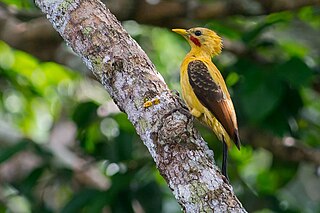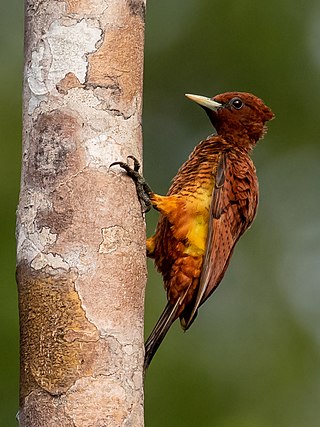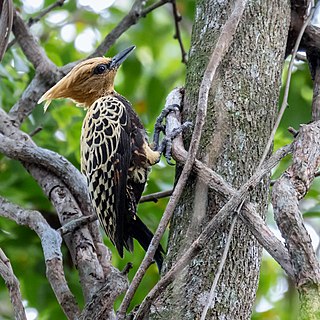
The chestnut woodpecker a species of bird in subfamily Picinae of the woodpecker family Picidae. It is found on Trinidad and in every mainland South American country except Argentina, Chile, Paraguay, and Uruguay.

The white-flanked antwren is a species of bird in subfamily Thamnophilinae of family Thamnophilidae, the "typical antbirds". It is found from Honduras to Panama in Central America, in every mainland South American country except Argentina, Chile, Paraguay, and Uruguay, and on Trinidad.

The cream-colored woodpecker is a species of bird in subfamily Picinae of the woodpecker family Picidae. It is found in every mainland South American country except Argentina, Chile, Paraguay, and Uruguay.

The plain xenops is a passerine bird in the Furnariinae subfamily of the ovenbird family Furnariidae. It is found in the tropical New World from southern Mexico south as far as northern Bolivia and east across Brazil.

The wedge-billed woodcreeper is a sub-oscine passerine bird in subfamily Dendrocolaptinae of the ovenbird family Furnariidae. It is found in Mexico, Central America, Brazil, Bolivia, Ecuador, French Guiana, Guyana, Peru, Suriname, and Venezuela.

Kaempfer's woodpecker, also known as the Piauí woodpecker and previously as the caatinga woodpecker, is a species of bird in subfamily Picinae of the woodpecker family Picidae. It is endemic to Brazil.

The rufous-vented ground cuckoo is a Vulnerable species of cuckoo in the tribe Neomorphini of subfamily Crotophaginae. It is found in Bolivia, Brazil, Colombia, Costa Rica, Ecuador, Nicaragua, Panama, and Peru.

The Amazonian antshrike is a species of bird in subfamily Thamnophilinae of family Thamnophilidae, the "typical antbirds". It is found in every mainland South American country except Argentina, Chile, Paraguay, and Uruguay.

The ocellated woodcreeper is a species of bird in the subfamily Dendrocolaptinae of the ovenbird family Furnariidae. It is found in Bolivia, Brazil, Colombia, Ecuador, Peru, and Venezuela.

The blond-crested woodpecker is a species of bird in the woodpecker family Picidae. It is found in Argentina, Brazil, and Paraguay.

The scaly-breasted woodpecker, also known as the scale-breasted woodpecker, is a subspecies of bird in subfamily Picinae of the woodpecker family Picidae. Some taxonomists consider it a separate species. It is found in Bolivia, Brazil, Colombia, Ecuador, Peru, and Venezuela.

The cinnamon woodpecker is a species of bird in subfamily Picinae of the woodpecker family Picidae. It is found in Colombia, Costa Rica, Ecuador, Nicaragua, and Panama.

The pale-crested woodpecker a species of bird in subfamily Picinae of the woodpecker family Picidae. It is found in Argentina, Bolivia, Brazil, and Paraguay.

The ringed woodpecker is a species of bird in subfamily Picinae of the woodpecker family Picidae. It is found in every mainland South American country except Argentina, Chile, Paraguay, and Uruguay.

The waved woodpecker is a species of bird in subfamily Picinae of the woodpecker family Picidae. It is found in Bolivia, Brazil, Colombia, Ecuador, French Guiana, Guyana, Peru, Suriname, and Venezuela.

The Andean flicker is a species of bird in subfamily Picinae of the woodpecker family Picidae. It is found in Argentina, Bolivia, Chile, Ecuador, and Peru.

The golden-green woodpecker is a species of bird in subfamily Picinae of the woodpecker family Picidae. It is found in Panama and every mainland South American country except Chile and Uruguay.

The yellow-throated woodpecker is a species of bird in subfamily Picinae of the woodpecker family Picidae. It is found in Bolivia, Brazil, Colombia, Ecuador, French Guiana, Guyana, Peru, Suriname and Venezuela.

The rufous-breasted piculet is a species of bird in subfamily Picumninae of the woodpecker family Picidae. It is found in Bolivia, Brazil, Colombia, Ecuador, and Peru.

The ochre-backed woodpecker is a species of bird in subfamily Picinae of the woodpecker family Picidae. It is endemic to Brazil.
























